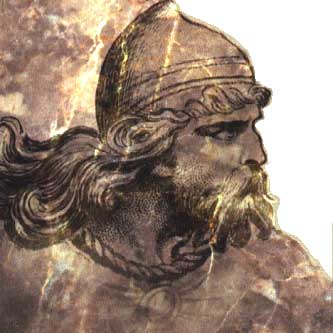In Anglo-Saxon literature and most likely in Anglo-Saxon times, men were measured by many of the same aspects of life that men are measured by today. Men of that time period were godless, fearless, fame seeking, and most of all, courageous. Warriors, sailors, exiles, and even gods were in search of these things and often achieved them through completing daring deeds, withstanding harsh conditions, or beating the odds. It wasn’t odd for men to die to get the job done either.
Beowulf, a Scandinavian warrior, not only killed a terrifying monster, the monster’s mother, and countless sea-monsters, but also killed a huge dragon too, achieving fame and showing a neighboring kingdom how much strength, courage, and fearlessness he had. It also seemed that heroes of that time had to boast about their deeds to other kingdoms and villages. In Beowulf, when Beowulf greets Hrothgar, he says,
“Hail, Hrothgar! I am kinsman and thane of Hygelac. In my youth I have set about many brave deeds. (Abrams, pg. 28)
How many times have you introduced yourself to someone and say, “When I was younger, I accomplished many great things? It wasn’t enough for a man to show just his people of his accomplishments, he had to make it know for everybody to see.
for a man to show just his people of his accomplishments, he had to make it know for everybody to see.
In The Wanderer, the author says,
“Men eager for honor bury sorrow deep in their breast.” (Wanderer, lines 16 & 17)
In most Anglo-Saxon literature, this “macho” theme is present. The Wanderer also states,
“No man is living…to whom I fully unlock my heart.” (Wanderer, lines
10 & 11)
“Who bears it, knows what a bitter companion…sorrow can be.”
Wanderer, lines 26 & 27)
The Wanderer is sprinkled with small lines like these to show that a real man can take anything that the world throws at him. Beowulf is similar to the Wanderer in that they both have the same “voice”. In Beowulf, Beowulf says,
“You will not need to hide my head if death takes me, for he will
have me blood-smeared; he will bear away my bloody flesh
meaning to savor it, he will eat ruthlessly, the walker alone, will
stain his retreat in the moor; no longer will you need to trouble
yourself to take care of my body. If battle takes me, send to
Hygelac the best of war-clothes that protects my breast, finest of
mail-shirts. It is a legacy of Hrethel, the work of Weland. Fate
always goes as it must.” (Abrams, pg. 29)
Just as he is about fight Grendel, showing that a real man can take whatever fate throws his way.
The Seafarer isn’t so much of a “manly” piece of literature, but it still deals with the same theme that exists in Beowulf and The Wanderer. Passages like,
“Hunger and hardship’s heaviest burdens.” (The Seafarer, line 3)
“Fast to the deck my feet were frozen, gripped by the cold…and
hunger’s pangs” (The Seafarer, lines 9 through 11)
show that you have to be tough and courageous on the ocean to make it on this earth. The Seafarer doesn’t deal so much with men overcoming enemies, but instead shows the experience of an aged sailor verses the excitement and ambition of a young sailor. The young sailor is convinced that he is going to leave his mark on the sea, that he’s going to take the world by storm, and the old man knows he won’t, but can remember a time when he used to think the same thing about himself. He knows that in time the young sailor will grow out of it.
In conclusion, the Anglo-Saxon hero and maybe even the Anglo-Saxon people in general learned to take whatever fate gave them and to take it without whining about it. In fact, they made up stories such as Beowulf, The Seafarer, and The Wanderer to show their children and anyone else who would listen, that if they took what fate gave them with courage, and without any fear, then they would be recognized for it. They learned that the best man isn’t necessarily the man who does what is right and just, although most of the time being courageous, getting fame, and the other aspects of Anglo-Saxon life went along with being right and just. In a lot of ways, this attitude is very similar to our sports starts of today. Football players, baseball players, and Olympic medallists alike have been banned from their sports for everything from doing drugs to abusing their spouses, but fans still love them and turn out for their games because they are good at the game that they play.
